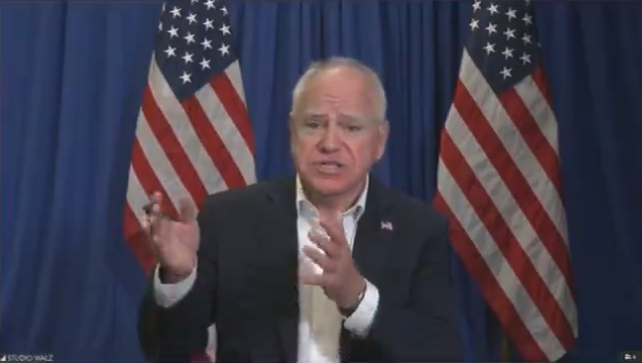Tim Walz recently weighed in on the ongoing discussion surrounding Vice President Kamala Harris’s comments regarding her alignment with President Joe Biden and his administration’s policies. During a segment on “The View,” Harris stated that over the past four years, she couldn’t think of any decisions she would have made differently than Biden, suggesting her policies would likely mirror his. This admission sparked concern among some voters and critics about the Biden administration’s future direction, especially in terms of pressing issues such as inflation, immigration, public safety, and support for American citizens. Harris’s reflections imply continuity in policy rather than a departure or reform, raising questions about her potential candidacy and leadership style.
The backlash against Harris’s comments was amplified by the response from her spokesperson, Mitch Landrieu, who claimed that the key distinction between Harris and Biden is that she is a “woman of color.” This remark has drawn attention for its seemingly superficial basis for differentiation, especially in the context of significant policy discussions. Critics argue that such statements reflect the Democratic Party’s increasingly prevalent focus on diversity, equity, and inclusion (DEI) at the expense of substantive policy debates. This has led to a perception that the party may prioritize identity politics over tangible improvements to the quality of life for everyday Americans.
Amid this controversy, Tim Walz attempted to downplay the significance of the differences—or lack thereof—between Harris and Biden in an interview. He suggested that voters should not concern themselves with distinctions between the two leaders, dismissing the notion that leadership style or policy differences are relevant to electoral considerations. His comments highlight a prevailing sentiment among some Democrats to maintain party unity and support for the existing leadership, despite growing discontent within certain voter demographics regarding the administration’s effectiveness in addressing critical issues.
Walz’s defense of Harris aligns with a broader Democratic strategy of minimizing internal conflict and presenting a united front as they prepare for future elections. By emphasizing that voters’ focus should not be on the nuances between Biden and Harris, Walz reflects an understanding of the potential electoral consequences of public ambivalence towards the administration’s achievements. The Democrats aim to rally their base around key issues that resonate with voters while avoiding distractions that could undermine their collective efforts.
However, many observers argue that by downplaying the distinctions and avoiding confronting criticisms, the Democratic leadership risks alienating voters who are increasingly concerned about economic stability, crime rates, and immigration policies. As conversations about the upcoming electoral cycle heat up, the party faces the challenge of addressing voters’ needs while maintaining the narrative of unity. The tension between a desire for progress and a commitment to existing leadership will continue to shape the Democratic Party’s strategy as they navigate the complicated political landscape ahead.
Ultimately, the intersection of identity politics and policy performance will be a significant theme in upcoming elections. The implications of Harris’s statements, along with the responses from Walz and other party leaders, underscore the ongoing debate about representation, effectiveness, and the expectations voters have for their leaders. As the political narrative evolves, the Democratic Party will need to carefully balance its focus on diversity with meaningful engagement on the issues that matter most to American citizens.

